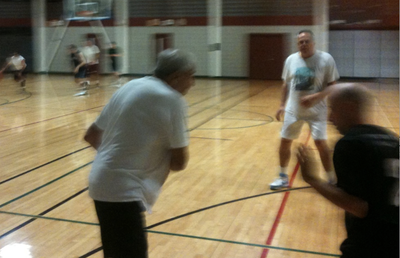Advertisement
Why To Exercise Today: Which Do You Want, A Good Old Age Or A Bad One?

This is Abe Gold. At 79, he still plays regular basketball at the Jewish Community Center in Newton. When he had his hip replaced, he missed about a month of play. If Abe is out there, why aren't you?
The Russians have a saying, "Starost nye radost," that translates loosely as "Old age is misery."
But it doesn't have to be that way, and one of the best ways to stave off the misery is — you guessed it — exercise. A new paper in the International Journal of Clinical Practice sums up 40 recent studies and reports that for non-smokers, exercise is the best way to ward off all kinds of age-related ills, from dementia to erectile dysfunction. (Quitting cigarettes is even better, but you can't do it if you don't smoke, of course.) The paper focuses on men, but the findings are applicable for women, too, its authors say.
The journal's publisher reports:
People who take regular exercise could reduce their risk of developing around two dozen physical and mental health conditions - including some cancers and dementia - and slow down how quickly their body deteriorates as they age.
Health benefits identified by the review include:
Regular moderate to intense physical activity is associated with decreased risk of coronary heart disease and ischaemic and haemorrhagic stroke.
A growing body of evidence suggests that increasing physical activity can also reduce the risk of certain types of cancers, osteoporosis, type 2 diabetes, depression, obesity and high blood pressure.
Evidence of the beneficial effects of physical activity in the primary prevention and management of cancer is growing and there is an association between higher levels of physical activity and lower cancer death rates.
Research has found that walking or cycling for at least an half-an-hour a day is associated with a reduction in cancer and that when this is increased to an hour cancer incidence falls by 16 per cent.
Studies have also shown that men who are physically active are less likely to experience erection problems.
There is growing evidence that physical activity could decrease the risk of dementia in the elderly.
This program aired on November 23, 2010. The audio for this program is not available.
